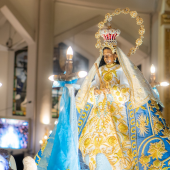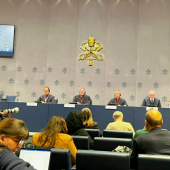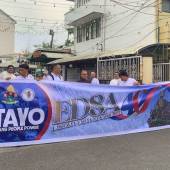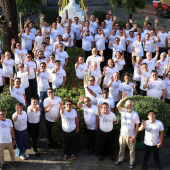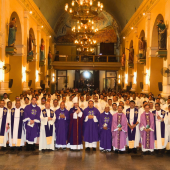Philippine Cardinal Blasts Corruption as Manila Floods Cause Deaths, Displacement, and Suffering

Cardinal Pablo Virgilio David has denounced government corruption and called for both prayer and concrete action, as massive flooding displaced hundreds across Metro Manila and other parts of the country.
“We are told it’s climate change, yes, climate change is real, and it is devastating,” he wrote in a pastoral letter. “But let us be clear: the real disaster here is corruption. The very funds meant to protect our people have been siphoned off by systems that enrich the few and endanger the many. We must name this for what it is: a sin against the poor, a betrayal of public trust, a mockery of justice.”
David cited the 2024 failure of a navigational gate protecting Malabon and Navotas. While the public was informed that the gate had been rehabilitated, it failed again after just a few days of heavy rain.
“This is not a new crisis, it is a recurring one,” he said. “And this year, the delays are even worse. How many more cycles of damage and neglect must our communities endure before real accountability is demanded?”
According to records from the Department of Public Works and Highways (DPWH) and the Japan International Cooperation Agency (JICA), the government has spent more than ₱1 billion (about $85 million USD) on flood control projects in Malabon and Navotas alone since 2003.
“And yet, as recent reports and Commission on Audit (COA) findings have shown, we still suffer from broken pumps, non-functioning floodgates, clogged canals, and substandard construction,” David said. “Some projects exist only on paper. Some facilities were abandoned even before completion. Others were declared finished but never actually completed.”
David also raised concerns about ₱142.7 billion (about $2.5 billion USD) worth of questionable insertions in the proposed 2025 national budget.
“A staggering list of road widenings and multipurpose halls was inserted in the early stages of budget preparation, allegedly by powerful legislators and their allies, with no transparency or community consultation. Meanwhile, our people wade through sewage and sleep in damp evacuation centers,” he said.
The cardinal appealed to the faithful to pray and to take concrete action against corruption.
“As a Church, we do not wield power over budgets and policies,” he said. “But we have a voice, and we must use it. Let us call on our public officials, from the barangay level to the halls of Congress, to subject all flood control and infrastructure projects to citizen audit, to publish all project details for public scrutiny, and to stop using government funds as currency for political favors.”
He also urged parish youth groups, campus ministries, and young professionals to stay informed, ask questions, and speak out. “Organize your communities and engage in civic life,” he added.
“Let us pray for an end to corruption, yes,” David said. “But let us also act. Faith without action is dead.”
The cardinal expressed his gratitude to all who donated cash and relief goods to help those affected by the flooding.
The combined effects of the southwest monsoon and tropical cyclones Crising, Dante, and Emong left at least 31 people dead, according to the National Disaster Risk Reduction and Management Council (NDRRMC).
The NDRRMC reported that 18,000 individuals sought shelter in government evacuation centers, while another 230,000 took refuge with relatives and friends.
Several Catholic churches in Metro Manila also opened their doors to evacuees. The Vincentian Foundation in Quezon City alone sheltered 700 people.
In total, more than 6.27 million individuals across all regions, except Eastern Visayas, were affected by the torrential rains and flooding, the NDRRMC said.
“Let us rise, not with floodwaters of despair, but with a tide of righteous indignation and hope,” Cardinal David concluded.
Radio Veritas Asia (RVA), a media platform of the Catholic Church, aims to share Christ. RVA started in 1969 as a continental Catholic radio station to serve Asian countries in their respective local language, thus earning the tag “the Voice of Asian Christianity.” Responding to the emerging context, RVA embraced media platforms to connect with the global Asian audience via its 21 language websites and various social media platforms.










